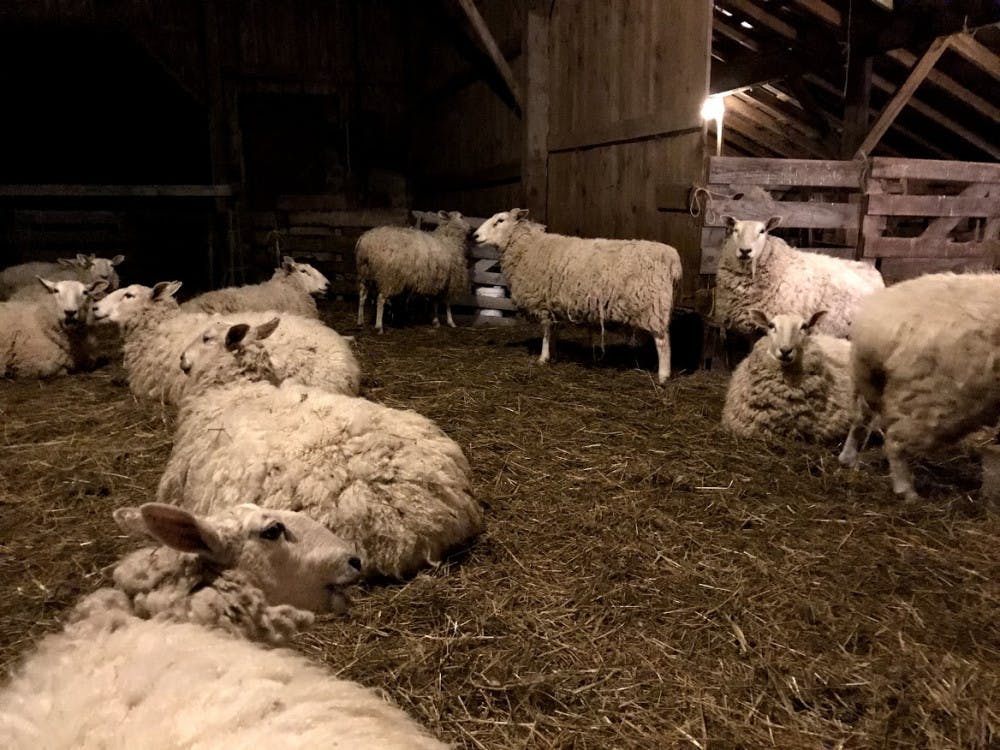MIDDLEBURY — Located fifteen minutes north of Middlebury’s campus is a small farm called Treleven, where many Middlebury students have spent long nights. Why? For a process called lambing.
Annually, each night during a multi-week-long stretch, students leave the College and make their way to the farm, returning early the next morning in dirty shoes, fatigued, smelling and exhilarated. They spend the hours in the Treleven barn, keeping the farm’s flock of sheep company, watching the pregnant ewes—female sheep—and assisting when one goes into labor.
However, the story begins much earlier. Just over five decades ago, two Swarthmore College students headed West, stopping only when they reached the Haight-Ashbury district in San Francisco. It was 1967 and Cheryl and Don Mitchell were chasing the Summer of Love. They were avid readers of the Whole Earth Catalog, a counterculture magazine preaching what Cheryl describes bluntly as, “that ultra purity” lifestyle. While at Swarthmore, Don was set on becoming a writer, Cheryl a high school English teacher, and they were growing up in a place where people experienced nature by “riding around and mowing the lawn and having a small yard.”
Despite this, and against all odds, hippies on the West Coast swept them up with the Back-to-the-Land Movement—a campaign to reinvigorate appreciation of nature and rejection of rampant consumerism—inspiring them to move back to the opposite coast and buy a farm. That farm is known today as Treleven.
Recruiting students to assist with lambing was Don’s idea, or as Cheryl described it, “Don’s wonderful gift to all of us.” When the couple moved to Vermont, they were young and without any farming experience. “We [were] not your prototypical family farm,” Cheryl said. “We had to work off the farm.”
Participating in the dairy industry is how many Vermont farms profit, but the Mitchells explained, “We knew we would never have the capital or wisdom to be dairy farmers.” They bought two sheep instead. The following year they expanded their flock to ten. They would shear the animals, drive the wool to Maine and have it spun into yarn for sale. However, this was not enough. “It’s very, very difficult to make a living with just the farm,” the Mitchells said.
So in 1984, Don got a job. He became a Middlebury professor and taught the class now known as “Contested Grounds”. Don found that discussion in this class always circled back to grappling with the construct of the idyllic family farm lifestyle, so eventually he decided to add a component to the syllabus: a night at Treleven during lambing season. He hoped the hands on experience would allow his students to complicate this myth themselves.
Though Don retired as a professor in 2009, the Mitchells have continued the annual lambing process with Middlebury students for the past nine years. Since Don first conceived of the idea, nearly a thousand students have spent a night in the barn. It was ironic; the mantra of the Back-to-the-Land Movement that led him to Vermont in the first place was something he was now, in a way, a tempting to deconstruct for new generations.
Indeed, the couple brought a young lamb to the lambing orientation they hold in Weybridge House, and over oohs and ahs of on-looking students, Cheryl provided a disclaimer: “It may happen. A lamb might die while you’re there. And that’s okay.”
Life at Treleven isn’t perfect, they insist, but it’s natural. Some of the young are even sold for meat. That doesn’t mean the farmers don’t connect with the animals. “I still don’t do it very well,” Cheryl admitted of her ability to cope with the death of a newborn. She explains that other aspects of her life, the non-farm related parts, have helped her along in this—and vice-versa.
Cheryl was a founder of the local Addison County Parent-Child Center, an organization dedicated to providing support for families. While there, she focused on a program that worked with children with serious disabilities of all sorts. Gradually, her two professions began seeping together.
“We would do everything we could to keep a lamb alive, that the mother knew wouldn’t make it,” she explained. Later, her parents moved onto the farm, and she was there as they passed away. It was after this loss that she began to see the lambing process—even when the lamb didn’t make it—as part of a larger process of life and nature, “something that’s bigger.”
Whether it was this revelation, Treleven’s roots in the wider Back-to-Land Movement or something else, the Mitchells approach their life and work through a holistic lens. On their fridge is a flyer titled: “Actions for the Earth.” Next to their front door is a white board with musings and deliberations. The farm is not merely a place for cultivation of all sorts. The Mitchells host camps for young children to learn about the environment, they welcome artists for retreats and residencies and they hire a summer intern through Middlebury College.
Cheryl and Don are uncertain whether they will continue lambing next year. While they do not want to end the tradition, they are aware that continuing to run it on such a scale could become too taxing. In the barn, alongside sheep and hay, is a shelf with a stack of journals dating back to before 1998. Each is filled with entries written by students, late at night or early in the morning, some before, and others after, ewes had given birth. Even if the Mitchells decide to move on from the job, it certainly won’t be forgotten.




